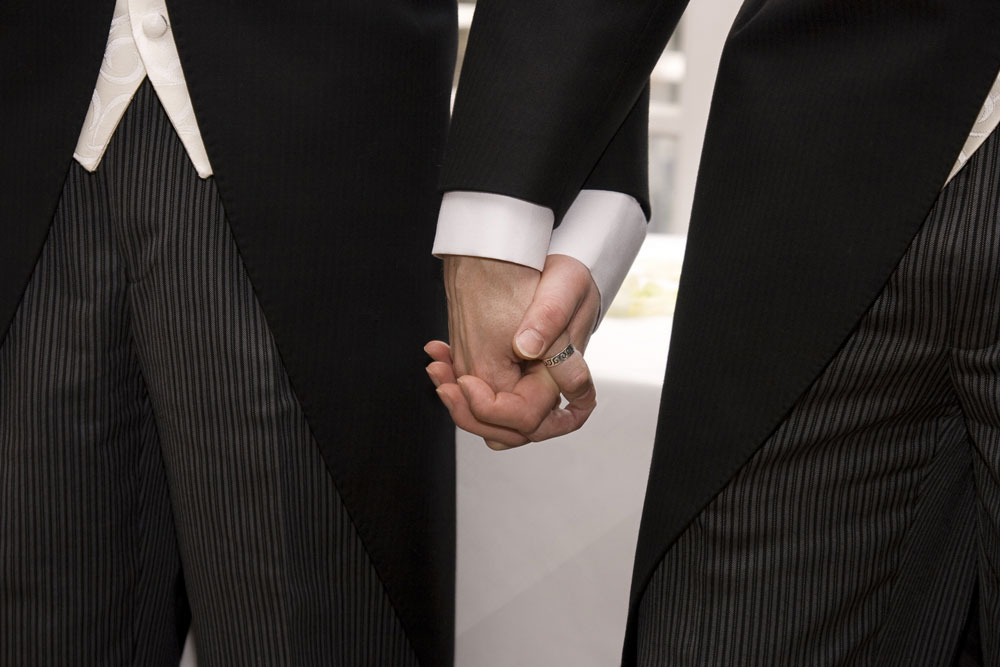The American Family: How Gay-Marriage Rulings Will Change Our Views

Today's (June 26) Supreme Court decisions on same-sex marriage will likely lead to greater acceptance of same-sex couples and families in the eyes of the American public, sociologists say.
The court ruled today to strike down the federal law called the Defense of Marriage Act (DOMA), which defines marriage as between a man and a woman. The ruling means that the federal government recognizes same-sex marriages granted by states, and that same-sex couples can receive federal benefits.
The court declined to rule on a case involving Proposition 8 — a California voter-enacted ban on same-sex marriage — saying that the defendants did not have the legal right to bring the case before the court. However, the decision will effectively legalize same-sex marriage in California, since a lower court has ruled the proposition unconstitutional.
With California becoming the 13th state to allow same-sex marriage, 30 percent of Americans now live in states that permit same-sex marriage. [See States Where Gay Marriage Is Legal (Infographic)].
"Both decisions are really moving America to a more inclusive vision of family," said Brian Powell, a sociologist at Indiana University.
But because the court did not explicitly address the constitutionality of same sex-marriage, it will likely have to return to this question in the coming years, experts said.
'Authentic' families
Get the world’s most fascinating discoveries delivered straight to your inbox.
Studies show that the label of "marriage" influences whether people view certain partnerships as "families," or not, Powell said.
In one study, Powell and colleagues asked more than 800 people whether they considered two partnered men living together without children a family. About a third said yes, but when told that the men were married, the percentage doubled to two-thirds.
Providing more legal rights to same-sex couples "will ultimately lead to more people seeing same-sex couples as true families," Powell said, who is an author of the book "Counted Out: Same-Sex Relations and Americans' Definitions of Family" (Russell Sage Foundation, 2012).
Public opinion
The decisions come at a time of increasing public support of same-sex marriage, saidStephanie Coontz, a professor at The Evergreen State College in Washington who researches marriage and family structure.
"This decision is a reflection, rather than a cause, of the rapidly changing attitudes" toward same-sex marriage, Coontz said.
Because courts tend to respond to changing social values, Coontz speculated that the same-sex marriage question will find its way back to the Supreme Court.
"If we continue to see this incredibly rapid shift in support of same-sex marriage, then it may eventually be seen as a civil rights issue that the court needs to intervene in,"Coontz said.
Powell noted that both Supreme Court decisions were close, 5 to 4 in both cases. Polls show that about 52 to 58 percent of Americans support same-sex marriage.
"It really parallels where public opinion is," Powell said. "If public opinion were ultimately nine people," it would be split 5-4, he said.
Gay marriage bans remain
There are about three dozen states in which gay marriage is not legal. That presents practical and emotional problems for some, experts say.
Studies show that bans on same sex-marriage can affect health and well-being. Gay people who live in states with same-sex marriage bans have more psychological distress, more negative feelings such as anger and sadness, and more depressive symptoms, said Sharon Scales Rostosky, professor of counseling psychology at the University of Kentucky who has studied LGBT issues.
"[We] won't end all of those negative effects on health and well-being until we end discrimination" of same-sex couples, Rostosky said.
Marriage is known to bring health benefits, but those benefits aren't as great for cohabiting couples who are not able to marry because of same-sex marriage bans. A recent study by Hui Liu, a sociologist at Michigan State University and colleagues, found that cohabiting same-sex couples had worse health than married heterosexual couples, a finding that Liu attributes in part to the social stigma against gay people.
Gay marriage bans also present gay couples with the question of whether they want to move to a state that recognizes their marriage, a decision that can have economic and psychological consequences, Rostosky said.
Nevertheless, today's rulings "will bring a renewed sense of hope and optimism for the future," Rostosky said.
Follow Rachael Rettner @RachaelRettner. Follow LiveScience @livescience, Facebook & Google+. Original article on LiveScience.com.

Rachael is a Live Science contributor, and was a former channel editor and senior writer for Live Science between 2010 and 2022. She has a master's degree in journalism from New York University's Science, Health and Environmental Reporting Program. She also holds a B.S. in molecular biology and an M.S. in biology from the University of California, San Diego. Her work has appeared in Scienceline, The Washington Post and Scientific American.


